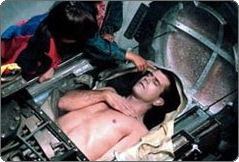Research Supports Possibility of Cryo-Preservation
New studies suggest that the entire human body could be cryo-preserved without the formation of damaging ice crystals, which normally damage cells and tissue.
New studies suggest that the entire human body could be cryo-preserved without the formation of damaging ice crystals, which normally damage cells and tissue.
Your support matters…American Chemical Society:
WASHINGTON, June 20 ? The latest research on water ? still one of the least understood of all liquids despite a century of intensive study ? seems to support the possibility that cells, tissues and even the entire human body could be cryopreserved without formation of damaging ice crystals, according to University of Helsinki researcher Anatoli Bogdan, Ph.D.
He conducted the study, scheduled for the July 6 issue of the ACS Journal of Physical Chemistry B, one of 34 peer-review journals published by the American Chemical Society, the world?s largest scientific society.
In medicine, cryopreservation involves preserving organs and tissues for transplantation or other uses. Only certain kinds of cells and tissues, including sperm and embryos, currently can be frozen and successfully rewarmed. A major problem hindering wider use of cryopreservation is formation of ice crystals, which damage cell structures.
Independent journalism is under threat and overshadowed by heavily funded mainstream media.
You can help level the playing field. Become a member.
Your tax-deductible contribution keeps us digging beneath the headlines to give you thought-provoking, investigative reporting and analysis that unearths what's really happening- without compromise.
Give today to support our courageous, independent journalists.




You need to be a supporter to comment.
There are currently no responses to this article.
Be the first to respond.